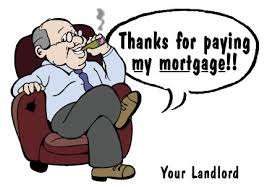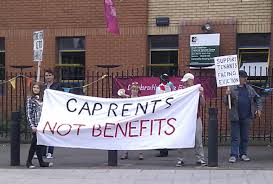I made a comment on a newspaper website the other day suggesting that people grabbing buy-to-let properties were making a negative contribution to the economy. Sure enough, I was subjected to a torrent of abuse including one reader who called me “a stupid little moron”. So let’s look at a few facts:
On TV and in the press we’re constantly being told that buy-to-let properties are the place to put our savings. With interest rates�below the level of inflation, most pension funds charging huge fees but�not giving any growth and the Government reducing access to the state pension, it�s understandable that people with a bit of spare cash are turning to property for an income and for their retirement.
And now, the Government’s Funding for Lending and other schemes to keep mortgage rates low and house prices high until the next election are making buy-to-let even more attractive.
But are these people providing a service by renovating and renting out houses and flats? Or are they just profiteers and parasites, pushing up house prices and then living off those who can�t afford to buy their own homes?
I think there are about 14.5 million homes in England (I don�t have the figures for the UK). Of these 14.5 million, around 3.6 million (a quarter) are buy-to-lets. If we assume that the average buy-to-let is costing �500 to �700 a month, this means that renters are paying somewhere between �1.8bn and �2.5bn a month (�22bn to �30bn a year) to live in someone else’s property. That�s �22bn to �30bn a year being taken mostly from the less well-off and put directly�into the pockets of the better-off. Or �22bn to �30bn being taken mostly from younger people starting out in their careers and given mainly to older people who have managed to accumulate a bit of capital. Buy-to-lets add nothing to our national wealth. They produce nothing that can be sold abroad.�They just move money from one section of society to another, from one generation to another. Moreover, as they account for about a quarter of home purchases, they push prices up beyond the means of many (younger?) people.
At the moment, buy-to-lets seem to be profitable investments for the lucky few � at least that�s what gushing BBC presenters and newspaper property writers�claim. But there are at least�two threats to the buy-to-let paradise.
Firstly, the government, particularly a Labour government,�might start to impose rent controls in a bid to reduce the ever-increasing cost of�housing benefits:
Housing benefit�has shot up from around �10bn in 2003 to �21bn last year and is expected to hit �25bn by 2015. This is unsustainable. And this projection doesn’t even take account of the one million Romanians and Bulgarians heading to Britain�from January 2014.
And secondly, when Labour get back into power in�685 days�and the deluded Ed Balls goes on a Brownian spending spree, he�s going to need money � lots of it. And there, ripe for the picking is �22bn to �30bn being taken by buy-to-let�owners.
Buy-to-let owners beware � it�s not unlikely that, under the banner of �fairness�, the repulsive (IMHO) Balls�may be coming after your money. After all, there�s not much else left for our incompetent, wasteful, financially-incontinent governments to tax. Mr Balls may make you rue the day you ever entered the buy-to-let market

















you can’t blame people for wanting to secure their future, and the rich list is full of people who have made their money from property. I also expect that most of the people who cannot find a deposit can find the money for sky TV ,booze, fags, holidays abroad, designer labels, taxis, take- aways and the latest mobile phones
The only time that “buy to let” makes any sense at all, is if you don’t have to borrow to buy the property that you wish to let.
In places where let properties are the norm… Many European cities for instance… The landlord is often the local church or university (or such like) and they think in the long term… hundreds of years… Not politicians!!!
So there is security of tenure, for the tenant, indeed some people hand their tenancy on to their children, and there is security for the property owner, who might well have bought the land on which the apartments/houses stand in the 1300’s or something.
I reckon it is a very good model, we have a very poor idea of the needs of people here, it sometimes seems to me that keeping people shit scared is the goal, rather than an unfortunate side issue.
Indeed one of the reasons that Hong Kong has been such a huge success, is because of a one time financial secretary there called Sir John Cowperthwaite, he was sent there from Scotland in the 1960’s…
A bit of an anonymous sort of bloke, who valued the idea that the one thing that every citizen must have, is a roof over his head. He set about making sure that this happened by building pretty modest apartments for anyone to rent at low, or no cost. And that was where his idea of welfare ended.
The net result is that until long after the Chinese took over and skewed things a bit, there was a single tax rate of 15%, and everyone had shelter… Those that were living in Cowperthwaite’s apartments were ambitious to leave them and get a place of their own… But nobody had to spend 75% of their effort on their roof, as we frequently do here.
When he retired to spend more time with his golf course, he was interviewed and asked about his job. He said that the hardest part of it was trying to get his colleagues to keep their noses out of the citizens lives…
He is regarded as a hero by many people from there, who frequently keep a bust of him on display.